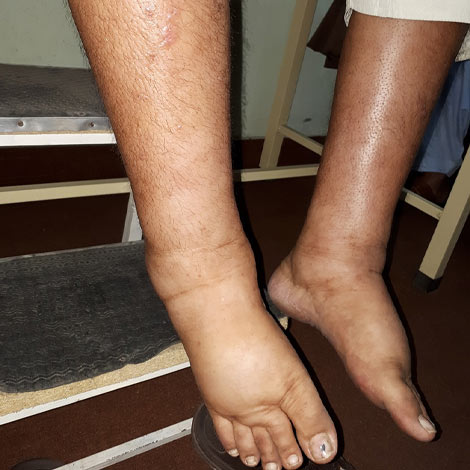Nephrotic Syndrome in Vijayawada
Nephrotic syndrome is a complex medical condition that affects the kidneys and can lead to various health complications. Understanding its causes, symptoms, and treatment options is crucial for individuals diagnosed with this syndrome and for those seeking knowledge about it. In this comprehensive guide, we delve into the intricacies of nephrotic syndrome, providing clarity on its definition, underlying causes, common symptoms, and available treatments.
What is Nephrotic Syndrome?
Nephrotic syndrome is a kidney disorder characterized by the presence of specific signs and symptoms, including proteinuria (excess protein in urine), hypoalbuminemia (low levels of albumin in the blood), edema (swelling), and hyperlipidemia (elevated levels of lipids in the blood). These manifestations result from damage to the clusters of small blood vessels in the kidneys called glomeruli, which are responsible for filtering waste and excess fluids from the blood to produce urine.

What are the main Causes of Nephrotic Syndrome ?
Nephrotic syndrome can have various underlying causes, including
Primary Glomerular Diseases
- Minimal Change Disease (MCD): This is the most common cause of nephrotic syndrome in children, characterized by abnormal kidney function without visible changes under a microscope.
- Minimal Change Disease (MCD): This is the most common cause of nephrotic syndrome in children, characterized by abnormal kidney function without visible changes under a microscope.
- Membranous Nephropathy: It involves thickening of the glomerular basement membrane, affecting the kidney's ability to filter waste.
- Membranoproliferative Glomerulonephritis (MPGN): This condition is characterized by inflammation and changes in the structure of the glomeruli.
Secondary Causes
- Diabetes: Diabetic nephropathy is a common secondary cause of nephrotic syndrome, resulting from uncontrolled diabetes damaging the kidneys' blood vessels.
- Systemic Lupus Erythematosus (SLE): Lupus nephritis, a complication of systemic lupus erythematosus, can cause nephrotic syndrome.
- Amyloidosis: Accumulation of abnormal proteins in the kidneys can lead to nephrotic syndrome.
- Infections: Certain infections, such as hepatitis B, hepatitis C, and HIV, can cause kidney damage and nephrotic syndrome.
Symptoms of Nephrotic Syndrome
The signs and symptoms of nephrotic syndrome may vary depending on its underlying cause and severity. Common symptoms include
- Proteinuria: Excessive protein in urine may cause foamy urine or result in reduced urine output
- Edema: Swelling, particularly in the legs, ankles, feet, and around the eyes, is a hallmark symptom of nephrotic syndrome.
- Hypoalbuminemia: Low levels of albumin in the blood can lead to fluid retention and edema.
- Hyperlipidemia: Elevated cholesterol and triglyceride levels in the blood may increase the risk of cardiovascular diseases.
- Fatigue and Weakness: Loss of essential proteins and nutrients through urine can result in fatigue and weakness.
- Decreased Appetite: Some individuals may experience a reduced appetite or nausea due to kidney dysfunction.
How it Diagnosis and Treatment?
Diagnosing nephrotic syndrome involves a combination of medical history review, physical examination, laboratory tests, and imaging studies. Treatment aims to address the underlying cause, manage symptoms, and prevent complications. Depending on the severity and cause of nephrotic syndrome, treatment options may include
Medications
- Corticosteroids: Prednisone and other corticosteroids help reduce inflammation and suppress the immune system.
- ACE Inhibitors and ARBs: These medications help control blood pressure and reduce proteinuria.
- Diuretics: Water pills such as furosemide and spironolactone can help alleviate edema by increasing urine output.
- Immunosuppressive Drugs: In cases of immune-mediated nephrotic syndrome, drugs like cyclophosphamide or cyclosporine may be prescribed.
Dietary Changes
- Limiting salt intake can help reduce fluid retention and edema.
- A low-fat, low-cholesterol diet may be recommended to manage hyperlipidemia.
Management of Complications
- Blood thinners may be prescribed to prevent blood clots, especially in individuals with nephrotic syndrome associated with thrombosis.
- Treatment of underlying conditions such as diabetes or lupus is essential to manage nephrotic syndrome effectively.
In some cases, particularly when conservative treatments fail to improve kidney function or when complications arise, individuals with nephrotic syndrome may require more advanced interventions, including kidney biopsy, dialysis, or kidney transplant.
Nephrotic syndrome is a multifaceted condition that requires comprehensive evaluation and management. By understanding its underlying causes, recognizing its symptoms, and exploring available treatment options, individuals affected by nephrotic syndrome and their caregivers can make informed decisions regarding their healthcare. Regular monitoring, adherence to treatment plans, and lifestyle modifications play vital roles in managing nephrotic syndrome effectively and improving long-term outcomes for patients.
Best healthcare providers

Unmatched Nursing Support

Top-notch Patient Care

Hospitable environment

Phenomenal intervention

